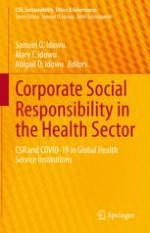The pandemic that struck in late 2019 - the coronavirus, commonly referred to as COVID-19 - affected every country in the world. This book examines how the pandemic has impacted healthcare institutions worldwide, and focuses on the international experience of COVID-19 in terms of healthcare delivery since 2019 and today. It highlights how healthcare facilities around the world have managed and continue to manage their obligations to their citizens. The book’s goal is to improve our understanding of the many negative and positive impacts of the pandemic on various aspects of our lives, including the health aspect, and how healthcare institutions could expand their ability to manage similar pandemics in the future without seriously compromising their ability to address other, regular health issues. At the same time, it takes a closer look at CSR, sustainability, ethics, and governance issues related to the pandemic, as well as current CSR practices in each of the countries reviewed.
Given its scope, the book will be of interest to a broad readership including researchers, practitioners, and students concerned with the pandemic’s societal and public health implications.
